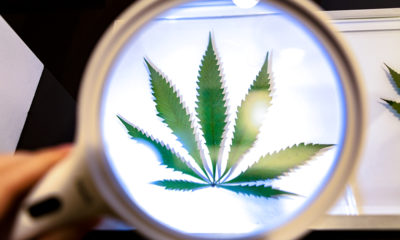
Current Events
Week in Review: Missouri Expunges Over 100,000 Cannabis Convictions
ICYMI: Catch up on the week’s latest news from across the cannabis spectrum.
In this week’s cannabis news round-up, Missouri expunges over 100,000 cannabis convictions following legalization; Ohio’s legalization limbo; and UK study reveals cannabis products may offer benefits for patients with ADHD.

Missouri Expunges Over 100,000 Cannabis Convictions Following Legalization
State officials in Missouri have expunged records for over 100,000 cannabis-related cases over the past year. The milestone results from provisions included in Missouri’s voter-approved adult-use legalization law, which officially took effect on December 8, 2022. This law set a one-year timeline for the expungement of convictions related to cannabis. Dan Viets, a NORML Board Member and co-author of the law, shared insights into this transformative process.
“This automatic expungement of cannabis cases is one of the most significant parts of Article XIV,” Viets says. Not only does it halt approximately 20,000 cannabis-related arrests annually, but it also compels the state government to rectify much of the harm inflicted on countless Missourians over the past century.
Viets anticipates that more cases will undergo expungement in the future but acknowledges the complexity of the task ahead. “The courts are going to need more time to finish the job and in fact, it might be years before all the cases from the past century are expunged,” he explained. “We’ve had more than 100 years of cannabis prohibition in Missouri. Many of the older cases have never been put on a database. So, it will take a lot of physical work to locate those paper records in boxes and attics and go through them.”
Missouri joins a growing list of 24 states and the District of Columbia that have enacted laws offering explicit pathways for expunging records related to low-level cannabis convictions. According to data compiled by NORML, state and local officials have granted over 100,000 pardons and performed more than 1.7 million cannabis-related expungements since 2018, marking a significant step toward rectifying the impact of outdated cannabis laws.

Ohio’s Legalization Limbo: Possession Allowed, Sales Pending
As of a recent shift in Ohio’s cannabis laws, adults in the state can possess and grow cannabis for adult use in their homes. However, there’s a notable catch: it remains illegal to purchase cannabis for recreational purposes.
This curious situation emerged after a call from Republican Governor Mike DeWine, who urged lawmakers to establish clear guidelines for Issue 2, a citizen-initiated ballot measure that received voter approval in November. While the state Senate reached a last-minute agreement just hours before the law’s implementation, the Ohio House opted not to address it.
According to Rep. Jamie Callender (R-OH), there is no set deadline for establishing a legal sales system. In the meantime, adults can proceed with home cultivation and personal possession as specified by the voter-approved initiative. He emphasized the importance of a thoughtful and thorough approach to addressing the aspects of the law that don’t take immediate effect.
Rep. Bill Seitz (R-OH) supported the decision to adjourn without voting on the 160 pages of related legislation currently pending in the House. He emphasized the complexity of setting up a system for cannabis sales, taxation and regulation, suggesting that rushing such an endeavor would be impractical.
Governor DeWine expressed concerns about potential negative outcomes resulting from the current situation, including the growth of black market sales and the accessibility of cannabis products contaminated with substances like fentanyl or pesticides. He characterized the state of affairs as a “recipe for disaster.”
Lawmakers in the Buckeye State had a four-month window in the previous year to take action on the issue. As a citizen-initiated statute, Issue 2 had to be presented to the Legislature first. After the GOP-controlled Legislature opted not to act, the measure was placed on the November 7 ballot, where it garnered 57% voter approval.
The law permits adults aged 21 and older to buy and possess up to 2.5 ounces of cannabis and allows for the cultivation of up to six plants per individual or 12 plants per household. It stipulated a nine-month period for the establishment of a legal cannabis purchasing system, subject to a 10% tax. The generated revenue was intended for administrative costs, addiction treatment, municipalities with dispensaries, social equity initiatives and job programs related to the cannabis industry.
Despite his personal opposition to legalization, Governor DeWine recognized the law and expressed concern about illegal sales gaining traction.
Meanwhile, some aspects of the new Ohio law can still be enforced immediately, according to Louis Tobin, Executive Director of the Ohio Prosecuting Attorneys Association. Although it will be challenging to establish probable cause for individuals carrying less than 2.5 ounces of cannabis, law enforcement will continue to monitor and address violations, including smoking in vehicles, carrying more than the legal possession limit, engaging in private sales and driving under the influence of cannabis.

Study Reveals Cannabis Products May Offer Benefits for Patients with ADHD
A recent study published in Neuropsychopharmacology Reports suggests that patients with attention-deficit/hyperactivity disorder (ADHD) may experience sustained improvements in their symptoms through the use of cannabis products.
British researchers conducted an assessment of the safety and efficacy of plant-derived cannabis products, including oils, flower, or a combination of both, in a group of 68 patients registered with the UK Medical Cannabis Registry. All participants had obtained authorization from their doctors to access cannabis products. Since 2018, specialists have been permitted to prescribe cannabis-based medicinal products to patients who do not respond to conventional medications. The study monitored the effectiveness of cannabis at intervals of one, three, six and twelve months.
The findings revealed notable enhancements in patients’ anxiety levels, sleep quality and overall health-related quality of life after receiving cannabis treatment. Furthermore, more than a third of the participants stopped taking at least one ADHD prescription drug medication during the study.
The study’s authors concluded that “CBMPs [cannabis-based medicinal products] may play a role in alleviating symptoms and co-morbid anxiety and sleep disruption associated with ADHD.” This case series is a pioneering effort to assess the clinical outcomes of patients enrolled in the UKMCR who have a primary diagnosis of ADHD and have been prescribed CBMPs for up to 12 months.
Previous research conducted on patients within the UK registry has indicated the effectiveness of cannabis products in managing various conditions, including chronic pain, post-traumatic stress, depression, generalized anxiety, migraines, inflammatory bowel disease and other ailments. These findings highlight the potential for cannabis products to provide relief for patients suffering from a range of health issues.























